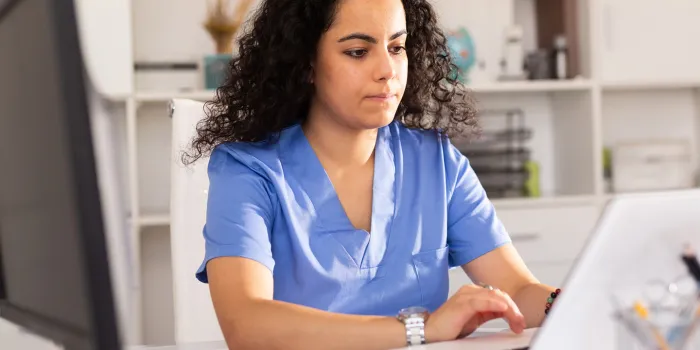You can turn to social media for information on virtually anything, from the private lives of movie stars to makeup tips and personal health.
But you can’t necessarily take what you find at face value.
And when you need the information to make important life decisions, that’s a problem — one that left Maya Bloomberg increasingly worried as she watched the rapid spread of misinformation during the COVID-19 pandemic.
A South Florida-based nurse practitioner specializing in nonmalignant hematology, Bloomberg realized the problem had a built-in solution: leveraging social media to provide information supported by medical and scientific evidence.
The result is @theHemeNP, the Instagram account where she now has more than 13,600 followers.
Suggested Reading: Bleeding Disorders Social Media Accounts to Follow
Q: Tell me more about the “aha moment” when you decided to start posting about bleeding disorders.
A: During the pandemic, there was so much misinformation out there, particularly about vaccines, and I was concerned that some of my patients were beginning to believe it as opposed to what the science showed. I essentially wanted to become a hub for patients to get reliable, easy-to-understand information that would empower them to become their own biggest advocates. Creating @theHemeNP was a marriage of my knack for explaining complex topics in simple terms with my creative and artistic side.
Q: It’s definitely catching on, which seems to reflect a growing sense of urgency to find reliable medical sources. With so much information online, it can be tough to separate fact from fiction.
A: That’s why I think it’s so important for health care providers to take to social media. Dissemination of information in the medical field used to rely on academic journals and conferences and speaking with colleagues. Now, when something’s happening in the news, one of the first places people go is social media, so if health care providers leverage it, it can be a bridge to patients and the general public, allowing them to take a more active role in their health care journey. I simplify evidence-based information from research and academic journals, highlighting the most important points to facilitate practical application in their lives.
Q: How often do people come to you with questions or concerns based on something they’ve seen online?
A: Many of my patients get information from social media, but we typically use it as a conversation starter. They’re not coming to me and saying, “I saw this, so it must be 100% true.” I’ve read that the percentage of U.S. adults on social media is at 72%, and many of them are using the information they gain there to inform their health decisions, which I think is empowering. But it also underscores the importance of being able to identify trustworthy sources. You can’t just accept everything you see as being a certainty. You have to do your due diligence.
Q: How do you talk with people about what to look for when they’re trying to find accurate information on social media? What cues do you tell them to pay attention to?
A: The type of account they’re looking at and the kinds of content it promotes are good starting points. Is it an account that promotes a lot of conspiracy theories or seems geared toward making viewers question medical science? If so, then you need to examine the information with a fine-tooth comb. But again, I like my patients asking me about what they find on social media. Sometimes they bring questions that I have to research myself. That’s the beautiful thing when it comes to medicine and science: We’re constantly learning.
Q: How has the focus of your posts changed since you began?
A: While I went to social media initially with the goal of combating misinformation, I’ve continued to dissect complex hematology topics to make them more understandable to laypeople without a medical background and have incorporated mental health awareness and education to help individuals navigate having chronic illness with more ease.
Q: Interesting. What prompted that?
A: Often, I get referrals for patients after they’ve had a life-changing event, such as having a child with severe hemophilia or experiencing bleeding complications during a surgery, and I discover that they had many red flags beforehand but didn’t realize it. The information that I provide on social media might reach people who have never considered that they might have a bleeding disorder, helping them to be more proactive about their health — and perhaps prevent problems from happening. Mental health has become a passion of mine after having such an empowering self-healing journey myself that I want to share my learnings since there is such an interplay between mental health and physical health.
Q: Based on your experience, what is the best way for health care providers to leverage social media?
A: By translating complex concepts into digestible and engaging content. I always say I like to educate and entertain. With social media, you have roughly three seconds to get somebody’s attention. So in addition to providing good information, you have to consider what will make a good hook: “How can I present the information in a way that’s actually going to engage them?” The education that you provide empowers patients to advocate for their own health because, at the end of the day, knowledge is power. So now that they have this information, what are they going to do with it? Does it inspire them to start thinking critically? Does it help them decide to obtain a second opinion? I think we’re shifting from a paternalistic type of decision-making to shared decision-making where patients are taking a more active role and becoming partners. But you can only do that if you have the knowledge and the education behind it.

